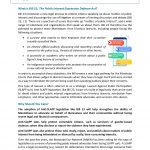Speak Up About Bill 23, The Public Interest Expression Defence Act
Consider registering to speak to Bill 23, The Public Interest Expression Defence Act. The Committee hearing for Bill 23 has been scheduled for Wednesday October 8, 2025. You can register online here or by phoning the Office of the Clerk at 204-945-3636. You can also submit written comments. We have prepared a backgrounder to assist the public understand the Bill better.
What is Bill 23, The Public Interest Expression Defence Act?
Bill 23 introduces a new legal process to protect citizens speaking up about matters of public interest and discourage the use of litigation as a means of limiting discussion and debate (Bill 23, s 2). There are a spectrum of issues that make up “matters of public interest”, and a wide range of individuals and organizations that speak up about them. Bill 23 therefore has the potential to protect many Manitobans from frivolous lawsuits, including people facing the following situations:
- A survivor who reports to their employer that their co-worker
sexually assaulted them. - An elected official publicly discussing and reporting conduct of
concern to the police (e.g., threats of violence or other harm). - A journalist or academic who writes an article about a public
figure’s long history of corruption. - An Indigenous water protector who protests the construction of
a new natural resource development.
In order to accomplish these objectives, the Bill creates a new legal pathway for the Manitoba Courts that allows judges to dismiss lawsuits when they have no legal merit and were started
as a way to intimidate the person being sued from speaking publicly about their concerns. This type of lawsuit is often referred to as a Strategic Lawsuit Against Public Participation (SLAPP suit). Anti-SLAPP legislation, like Bill 23, is part of a suite of legal tools that can be used to shield citizens and public interest organizations from frivolous lawsuits, retribution from employers, and other approaches used to intimidate advocates and survivors into silence.
Why Should You Care?
The adoption of Anti-SLAPP legislation like Bill 23 will help strengthen the ability of Manitobans to advocate on behalf of themselves and their communities without facing
severe legal and financial consequences.
Anti-SLAPP laws help protect vulnerable citizens, such as survivors of gender-based violence, when they disclose or report the violence they have experienced.
Anti-SLAPP laws also protect those who study, report, and publish about matters of public interest from being intimidated or silenced by costly, time-consuming lawsuits.
Over the past five years, the Manitoba Eco-Network (MbEN) has been asking for this type of legislation as a means of preventing public interest advocates from facing SLAPP suits. A SLAPP
suit is a legal proceeding (e.g. lawsuit for defamation) intended to discourage someone from making public statements about their concerns and is an approach that has been used across
Canada, including Manitoba, to restrain the activities of public interest advocates and reporters.
The One Big Problem with Bill 23
Although the Manitoba Eco-Network is supportive of this Bill we believe sub-section 4(2) should be removed.
The Government of Manitoba added Section 4(2), which creates an exception for injunction proceedings. An injunction is a court order that requires a party to do, or stop taking, a specific action. Injunctions are granted when financial penalties alone won’t stop and fix the problem, such as in situations where irreparable harm could occur.
Sub-section 4(2) of Bill 23 will result in situations where, when a legal proceeding involves an injunction, the filing of a dismissal motion under s 3 will not pause the proceeding, even if the injunction ends up being meritless. A dismissal motion will not pause an issued injunction or stop an injunction from being sought while another proceeding is paused under s 4(1) of the Act, leaving a pathway open to drain a defendant’s resources that way.
To learn more click on the image below to read our backgrounder.


